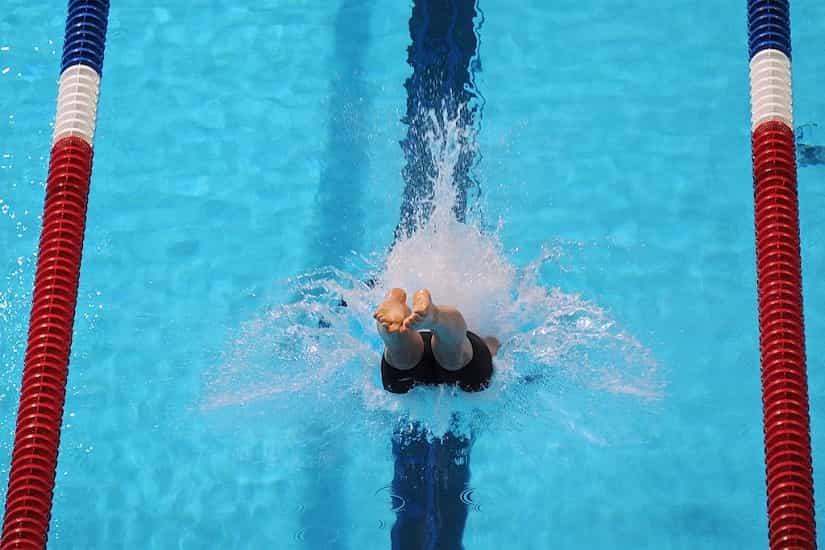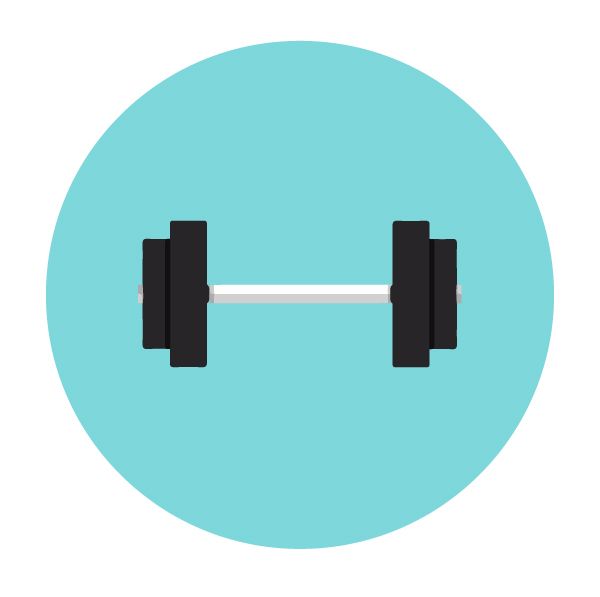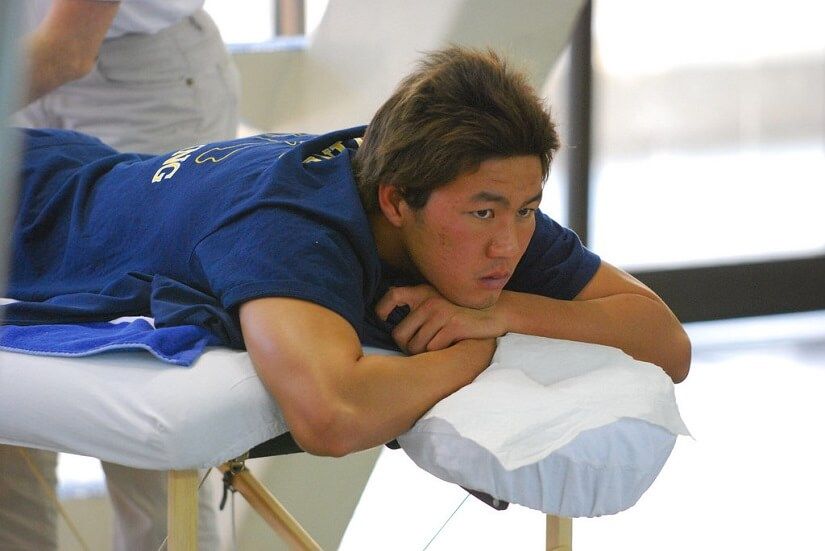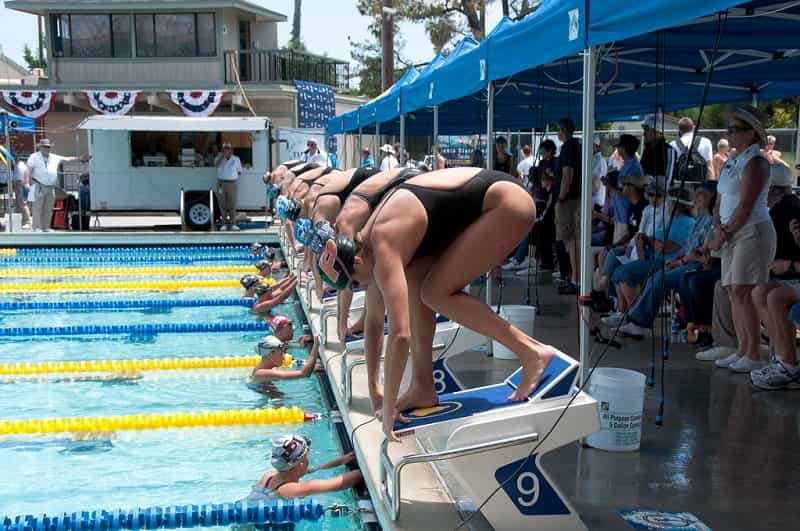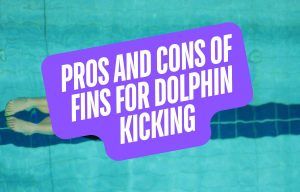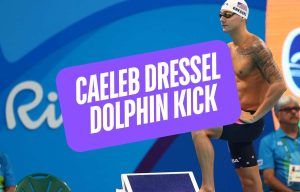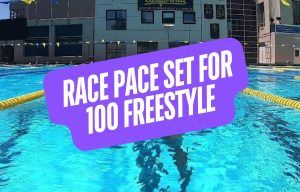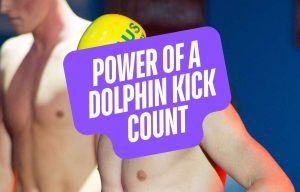Lifting weights has long been thought to be a way to boost performance in the pool. Today a group of top strength and conditioning coaches from elite NCAA programs discuss what swimmers need to know about weight training.
Swimming at the collegiate level is a time of change and growth.
With a totally new environment, new training partners, and the addition of weight training (for many swimmers for the first time), it can be a confusing and frustrating experience.
It doesn’t have to be this way, however.
By adjusting expectations, being willing to listen to your new coaches, and by staying ahead of the injury curve you can make the most of your time competing for your new school.
Five strength & conditioning specialists from some of the top NCAA programs in the country including NC State, Stanford and Texas A&M, stopped by to share advice for swimmers who are on their way to post-secondary swimming for the first time, or some reminders for swimmers returning for another year:
It’s all about technique.
“We focus a majority of our time on getting the most efficient range of motion for each individual before we worry about putting a heavier load on,” says Tanna Burge, a strength and conditioning coach who works with the swim team in her role as Director of Sports Performance at Texas A&M.
“It sounds simple and basic, but pulling back and hammering down the technique, mobility, rate of force development, and end range strength has made a huge impact on our student-athletes.”
The benefits of having a strong focus on technique in the gym, in the same way that you would in the water, also helps swimmers mentally.
“It releases them from the stress of feeling like they have to lift as heavy as possible every time they come to the weight room, and helps them understand the transfer of strength, force, power and flexibility from the weight room to the pool,” adds Burge.
Start simple.
Swimmers are comparison-making machines. We scour the web for splits, results and the training of our competition. We measure the performances of our practices from day-to-day and week-to-week.
It’s natural, we are competitive swimmers, after all. And this sense of competitiveness is obviously going to extend itself into the weight room.
Some swimmers will show up on day one having had some strength training background, while others couldn’t tell you the difference between a deadlift and a plank. Your strength coach exists in order to provide a training framework that serves not only your goals, but to scale you into the training.
Related: Does Dryland Improve Sprint Swim Performance?
“There is a definite separation in the young swimmers I see these days, about half are already lifting/training and the other half don’t lift at all. For those beginning a new training protocol, keep it as simple and basic as possible for as long as possible,” says Burge.
For incoming freshmen in particular, forget the assumption that you will be doing the exact same stuff that the upperclassmen are doing.
“A common assumption new student-athletes make is that they will be expected to jump right into the same program as returners,” says Katlyn Haycock, who oversees the program design and implementation for the swim team at the University of Michigan.
“And this is not the case. We will begin an athlete on a program that is appropriate for his or her training age and provide the required coaching at all times.”
Show up ready to work.
If you are dead-set on showing up one day-one ready to work, Jason Dierking, strength and conditioning coach for the University of Louisville’s swim program, has advice for you.
“Focus on mastering proper movement mechanics with your own bodyweight,” says Dierking.
”Having the ability to squat, hip hinge, and do a perfect chest-to-floor push-up will put you ahead of 75% of your fellow freshmen.”
If you are fully healthy and you have decent mechanics you should also be prepared to run.
Related: Skipping for Swimmers: Improve Your Ankle Strength & Kick Faster
“You will do a lot of dryland training in college, and chances are that will include running. Make sure you are able to comfortably run 2-3 miles before you get on campus and you will make your life easier.”
Trust the process.
Excellence in the pool and the gym requires a bit of a blind commitment. You place faith in the hard work you do in order to see the results you want.
And as a competitive swimmer you know that there will be bumps, setbacks and outright failures on the way.
It’s simply part of the deal when it comes to achieving awesomeness.
This is just hard to remember when you feel like other athletes are progressing faster than you in the gym (and the pool).
“Remember that your strength coach has your best interests in mind when designing your training program,” says Nathaniel Brookreson, who as Director of Strength & Conditioning for Olympic Sports works with the swim teams at North Carolina State University.
“Sometimes it is necessary to take a step back and work on the basics to allow you to take two steps forward,” adds Brookerson.
“Things like movement competency, general strength and resiliency must be prioritized over anything fancy and novel. Simply focus on how you can get better that day, that moment and embrace the process over worrying about the outcomes.”
If there is uncertainty, ask.
The key to releasing some of that competitive fire that leads swimmers to jacking up the weights before they are ready for them is to listen to the “why” from your strength training coach.
“One of the key elements of my programming for swimmers is educating them on the ‘why?’ of everything,” says Burge.
“When they understand why they are doing a certain exercise and how it directly relates to their performance in the water, there is much greater buy-in,” says Burge.
If you are feeling confused or lost with your training it’s best to get to understanding the “why.” Your strength and conditioning coach is an expert and will be prepared to help you understand the purpose behind the work, so ask.
You aren’t sleeping enough.
The research on how sleep affects athletic performance is clear-cut—the longer you try to shortcut your time between the sheets the harder your performance in the pool will feel, the slower your reactions and explosiveness, and the more miserable of a person to be around you become. (Science.)
“Don’t underestimate the power of recovery,” notes Haycock.
“I consider it the most important element of recovery. College athletes in general do not receive adequate sleep.”
Research done on swimmers at Stanford showed just how pivotal a role added sleep in the performance. When athletes underwent a period of sleep extension (getting 9-10 hours of sleep per night) performance approved across the board, from turn time, start time, with times to 15m dropping by over half-a-second.
Social engagements will come flying at you left, right and center. Assignments, exams and labs will cause your weekly schedule to creak under their weight. And, of course, the workouts in and out of the pool.
It’s on you to manage your studies, social life and training so that when you walk on deck for morning practice you are at least mostly ready to kick butt.
Be proactive about staying injury-free.
Most college and university programs have an abundance of support staff that you could only dream about during your age group swimming days.
However, all the physical therapists, trainers and coaches in the world can’t substitute you doing the things you need to do to stay injury-free over the course of the swim season.
“Make sure you are proactive in maintaining your physical health,” notes Jason Quan, an assistant sports performance coach who works with the swimmers at Stanford University.
This means actually doing the pre-hab that you are assigned. Whether’s it’s mobility work to ward off swimmer’s shoulder, doing core work for better stability in the water, it’s on you to stay ahead of the injury-curve.
Your posture can be better.
Swimmers are used to being told to have better body position in the water. We know that we swim fastest when our body is in alignment, with our shoulders in position, our back straight and core engaged. Despite this knowledge we slouch our way through the rest of the day.
Problems really start to happen when this bad posturing extends into the weight room.
“Proper posture when lifting is crucial,” notes Michigan’s Haycock. “Swimmers are used to the buoyancy of water providing postural support.”
With a culture of sitting bad posture is already a problem, but swimmers are especially disposed to the forward-rounded shoulders and unsupported mid-section prevalent in today’s society.
“Most everyone can improve posture,” Haycock adds. “But swimmers tend to be prone to poor posture due to the nature of the sport.”
In Summary
Swimming in university can be a fun and exhilarating experience. For those who come from small rural clubs the camaraderie and common team goal can be a welcome addition to your swimming. And even those coming from larger age group clubs can find it refreshing being with a group of swimmers all the same age.
That being said, the newness of it all, being away from home for the first time, no one on your butt to get schoolwork done, and the new program can be overwhelming.
At the end of the day remember to trust the process. To ask questions and listen. And to be proactive in staying healthy.
Do these things and your swimming experience at university will not only be more enjoyable, but will also result in faster swimming.
A big THANK YOU to the following S&C specialists for taking the time to contribute to this article:
- Tanna Burge is the strength and conditioning coach for not only swimming, but also oversees all non-football S&C programs at Texas A&M. You can catch up with the Aggies swim team on Twitter.
- Katlyn Haycock does the strength training programming and implementation for the men’s and women’s swim team at the University of Michigan. Follow the news and results of the team on Twitter here.
- Jason Quan is a Sports Performance Coach who has been working with the women’s swimming team at Stanford University since 2011. You can stay up-to-date with the Stanford Cardinal swim teams on Twitter here.
- Nathaniel Brookreson is the Director of Strength & Conditioning for Olympic Sports (including the swim teams) for the North Carolina State University Wolfpack. Follow the NC State swim team on Twitter, and catch up with Nate at Elite Physical Preparation as well.
- Jason Dierking is the assistant director of sports performance at the University of Louisville, where he works with the men’s and women’s swim teams. You can catch up with Jason on Twitter here.
Resources:
The Training of Florent Manaudou. French sprinter Manaudou and his coach Romain Bernier discuss his preparation and training for the 2012 London Olympics, where he won the 50m freestyle.
Top 5 Core Exercises for Swimmers. Core strength is one of those buzz words that is spoken about a lot on pool decks, but few swimmers truly understand. Here are some exercises specific to swimmers to help you swim faster.
Creatine for Swimmers: What You Need to Know. Creatine is one of the most popular supplements for increasing athletic performance, but does it actually help swimmers train and race faster? Here is what you need to know.

